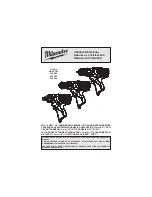
12
UNL
OC
K
WARNING:
Be prepared for binding or bit breakthrough. When
these situations occur, drill has a tendency to grab
and kick opposite to the direction of rotation and
could cause loss of control when breaking through
material. If not prepared, this loss of control can result
in possible serious injury.
When drilling metals, use a light oil on the drill bit to keep
it from overheating. The oil will prolong the life of the bit
and increase the drilling action.
If the bit jams in workpiece or if the drill stalls, release
switch trigger immediately. Remove the bit from the
workpiece and determine the reason for jamming.
WARNING:
Always wear safety goggles or safety glasses with
side shields when operating your drill. Failure to do
so could result in dust, shavings, loose particles or
foreign objects being thrown into your eyes, causing
possible serious injury.
DRILLING
See Figure 8.
When drilling hard smooth surfaces use a center punch
to mark desired hole location. This will prevent the
drill bit from slipping off center as the hole is started.
However, the low speed feature allows starting holes
without center punching if desired. To accomplish this,
simply operate your drill at a low speed until the hole
is started.
The material to be drilled should be secured in a vise
or with clamps to keep it from turning as the drill bit
rotates.
Hold tool firmly and place the bit at the point to be
drilled. Depress the switch trigger to start tool.
Move the drill bit into the workpiece applying only
enough pressure to keep the bit cutting. Do not force
or apply side pressure to elongate a hole.
OPERATION
BIT STORAGE
See Figure 7.
When not in use, bits provided with your drill can be
placed in the storage area located on the bottom of
your drill as shown in figure 7.
SCREWDRIVER
BITS
BIT
STORAGE AREA
Fig. 7
LEVEL
Fig. 8
LEVEL DRILLING
See Figures 8 and 9.
Two levels are recessed in the motor housing of your
drill-driver. One is located on top, while the other is
located on the end. They can be used to keep drill bits
level during both horizontal and vertical drilling opera-
tions.
LEVEL
Fig. 9


































